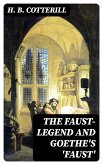In "Locrine," Algernon Charles Swinburne presents a richly woven tapestry of themes revolving around love, betrayal, and the inexorable tide of fate. Written in the classic blank verse that characterizes much of Swinburne's oeuvre, the play captures the tumultuous emotions of its characters through vivid imagery and keen psychological insight. Set against a mythic backdrop, the narrative draws from the ancient legend of Locrine, exploring the tragic consequences of lust and ambition, making it both a poignant reflection on human nature and a commentary on the socio-political dynamics of his time, particularly in the context of Victorian morality. Swinburne, a pivotal figure in the Victorian literary scene, often oscillated between themes of beauty and moral complexity. His exposure to classical literature and the influences of his contemporaries prompted him to delve into the depths of human experience, allowing him to create a work that is as thematically rich as it is stylistically innovative. His fascination with the intricacies of emotion and the forces that drive individuals to their extremes is palpable throughout "Locrine," drawing on his personal struggles and philosophical musings. This work is a must-read for scholars and enthusiasts of Victorian drama alike, offering valuable insights into the period's aesthetic and ethical dilemmas. Swinburne's mastery of language and profound understanding of his characters render "Locrine" not only a significant literary piece but also a timeless exploration of the human condition, inviting readers to reflect on their own lives through its compelling narrative.
Dieser Download kann aus rechtlichen Gründen nur mit Rechnungsadresse in A, B, BG, CY, CZ, D, DK, EW, E, FIN, F, GR, H, IRL, I, LT, L, LR, M, NL, PL, P, R, S, SLO, SK ausgeliefert werden.









